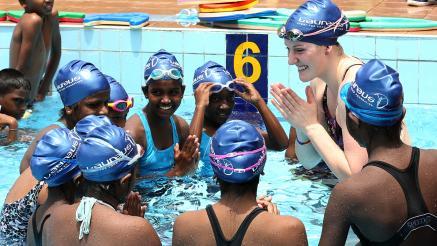
- Figures from Laureus global survey suggest that the idea of “boys’ sports” or “girls’ sports” is becoming an outdated concept
- ‘It may not be a revolution yet, but I feel this is a significant snapshot of the way things are going. One of our pillars at Laureus has been our total commitment to gender equality’ says Laureus Sport for Good Chairman Edwin Moses
- Laureus supported more than 250 community sports progammes around the world involving more than 270,000 young participants in 2020
Traditionally male-dominated sports are being challenged for popularity by sports and physical activity usually more favoured by girls and young women, while girls are also increasing their involvement in sports once regarded as predominantly male – suggesting the idea of “boys’ sports” or “girls’ sports” may be becoming an outdated concept.
Figures show grass roots sports with strong or equal female involvement are up: netball by 73%, swimming over 200%, dance 112%, volleyball 11% and track and field by 41%.
While long-established, mainly male-dominated sports, are down: football by 17%, basketball 6%, rugby 18% and cricket 13%.
The change is revealed in the Laureus Sport for Good Annual Review, published today, which monitored the activities of more than 250 community sports programmes around the world, involving more than 270,000 young participants, in 2020.
The trend is significantly stronger in many sports often seen as male-dominated, where girls in these targeted Sport for Development programmes are challenging the norm and overcoming the more established pattern of girls dropping out of sport as they reach adolescence.
One of the biggest rises in participation over the year was for boxing and martial arts, which involved 52,624 young people in Laureus programmes. Generally regarded as a male preserve, Laureus supports several programmes which are principally female based or appeal to all.

Luta Pela Paz (Fight for Peace) in Brazil, supports young women across the 16 communities of Maré, a favela in Rio de Janeiro. Its programme is aimed to mitigate the deepening of gender inequality and build networks of protection for girls and young women who found themselves left more vulnerable by the pandemic.
Boxgirls Kenya, which was shortlisted for the 2021 Laureus Sport for Good Award, uses boxing to empower girls in Nairobi, creating safe spaces to learn about their rights, promoting their leadership, ensuring access to education and strengthening their self-esteem and confidence.
The figures suggest that “girls’ sports” or “boys’ sports” may becoming an outdated concept. Programmes like Boxgirls are turning that familiar stereotype on its head as more and more girls and young women want to make their own choice.
Olympic legend Edwin Moses, Chairman of Laureus Sport for Good, said: “We can’t say it’s a revolution just yet, and these statistics come only from the charitable programmes around the world we support, but I feel this is a very significant snapshot of the way things are going.
“One of our pillars at Laureus has been our total commitment to gender equality. It’s one of the United Nations Sustainable Development Goals we support and it is something we insist is a consideration across our entire portfolio, and this is a welcome sign that we are getting it right.
“Traditionally there is a substantial drop in sporting engagement when girls hit adolescence. One of the crucial factors to counter this trend is to adapt the way sport is delivered. It is not about choosing ‘sports that girls like’, but delivering sport in a way that makes it relevant and responsive. These figures show that they respond,” added Moses.
Participation levels of females in Laureus Sport for Good programmes are currently 47.8%, a better ratio than the levels in sport as a whole.
Other figures in the review show that the support and work of Laureus Sport for Good in 2020 helped 97,960 children and young people to feel less socially isolated despite lockdown. Meanwhile, with schools around the world closed, Laureus and partners helped 98,354 children and young people to continue to engage with or complete education.

With domestic violence rising, 10,337 children and young people took action against violence against girls and women. 53,945 young people were provided with the technical skills required to access employment opportunities and 39,772 accessed work experience and internships.
Adam Fraser, Chief Executive of Laureus Sport for Good, added: “It is hugely encouraging to see the growth in these sports and the leadership roles girls and young women are taking in many of them, but this is not an implication that one sport is ‘better’ than another. In the end, it comes down to how sport is and should be delivered – via quality, intentional coaching designed to be inclusive, and to support young people’s social and emotional learning and mental as well as physical health.
“Since Laureus was created in 2000, we have improved the lives of more than six million young people. Sport for Development is a team game. Working together, we believe we can overcome any challenge. Even in a time of lockdowns and social isolation that remains the case.”










Add new comment